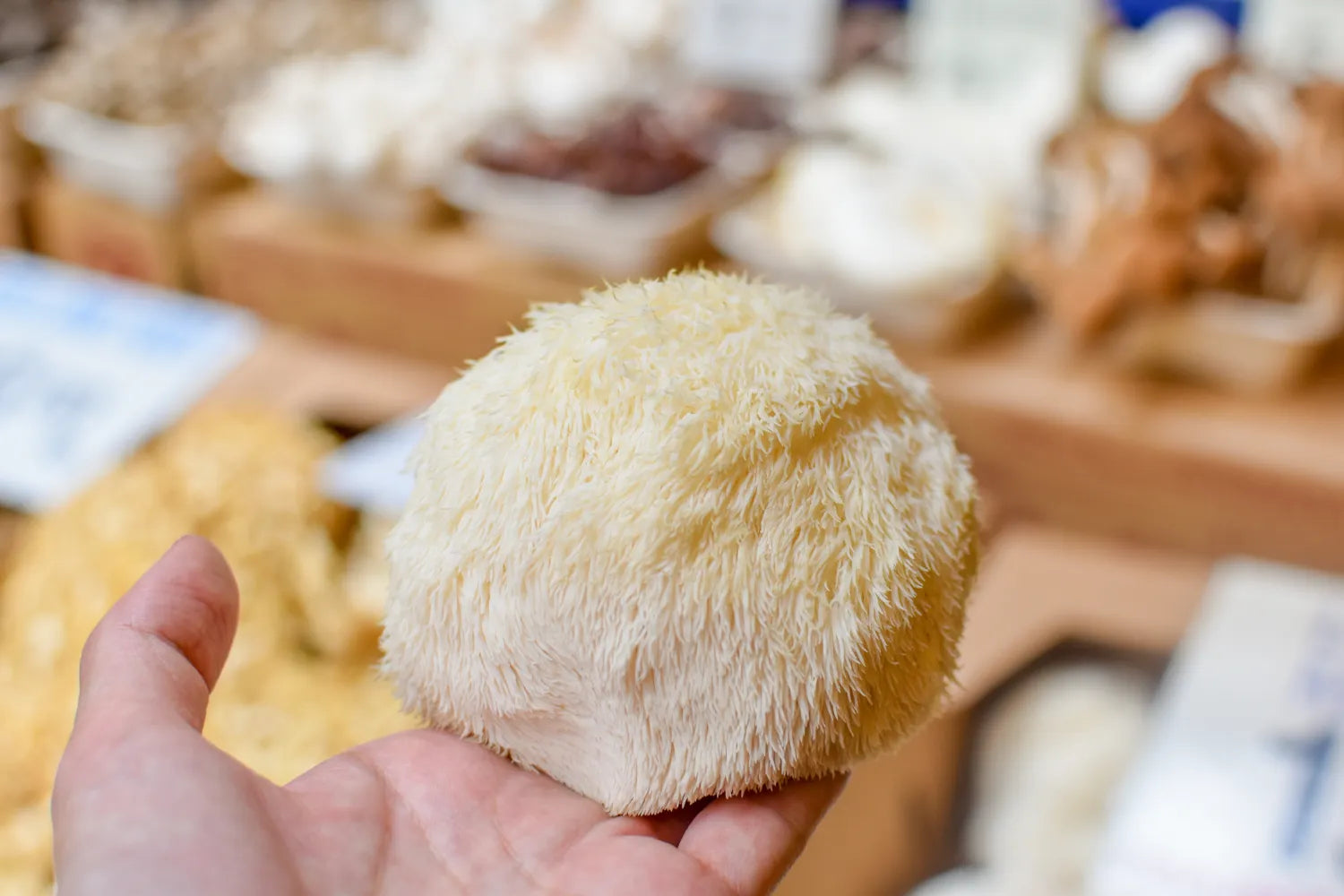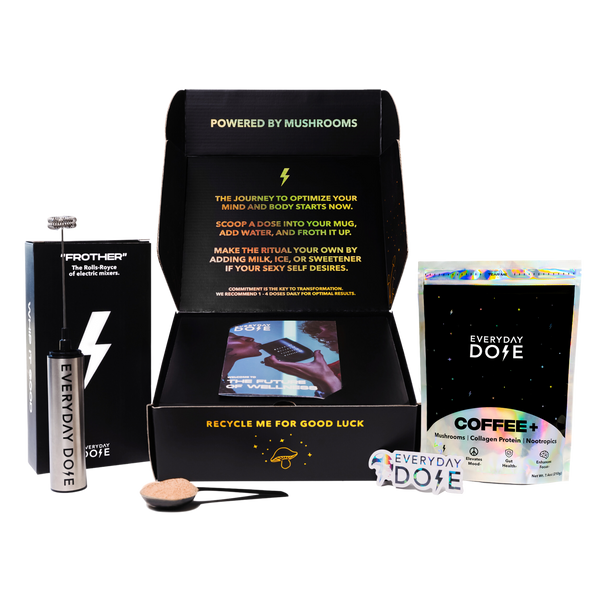Lion’s Mane Dosage: How Much Should You Take?

Isn’t it wonderful when a wellness trend actually lives up to its hype? One trendy ingredient that we just can’t get enough of is lion’s mane mushroom.
This medicinal mushroom has multiple potential benefits, and more research is coming out that makes us confident this ingredient’s hype is well-deserved. But how much lion’s mane should you take to actually experience the benefits? Here’s a breakdown of the benefits of lion’s mane and how you can experience them for yourself.
What Is Lion’s Mane Mushroom?
Lion’s mane is an edible mushroom that grows in Asia, Europe, and North America. Formally known as Hericium erinaceus, lion’s mane belongs to the Hericenones family.
Lion’s mane is usually white and is very large, often resembling giant pom-poms. However, it can also look quite shaggy, which is why it is also called “old man’s beard.” In Japanese, this mushroom is called yamabushitake, which can be loosely translated to “mountain monk mushroom.”
Lion’s mane has the most profound history in Asian countries. In China, it has been used for hundreds of years in traditional Chinese medicine as a tonic to support the heart, lungs, spleen, liver, and kidneys. In Japan, some monks historically used lion’s mane to increase their ability to focus during meditation.
What Are the Health Benefits of Lion’s Mane?
Lion’s mane mushroom might sound like something out of a storybook, but its benefits are very real. A few of the benefits of lion’s mane include its ability to support brain function, encourage a healthy gut, and promote long-term wellness. Here, we’ll review the health benefits of lion’s mane, as supported by clinical trials and placebo-controlled scientific studies.
Supports Cognitive Function
Lion’s mane mushroom may support the body’s production of nerve growth factor (NGF), which helps maintain neurons in the brain and promote a healthy nervous system. This can contribute to overall brain health, encouraging feelings of relaxation and clear thinking.
Encourages a Healthy Gut
Lion’s mane mushrooms contain beta-glucans, a type of polysaccharide that can help support gut health. These beta-glucans are made of fiber, which can feed good gut bacteria in the digestive system. Over time, this can help encourage smooth digestion.
This mushroom also contains probiotics, which add to the number of good gut bacteria in your body. Some preliminary animal studies even suggest that lion’s mane may support the integrity of our intestinal walls.
The gut also plays a large role in the immune system. Because of this, lion’s mane mushroom extract may also support immune health during times of stress. The fiber content of lion’s mane may also potentially support healthy blood sugar levels.
Promotes Long-Term Wellness
Finally, lion’s mane also contains antioxidants. These are molecules that contain extra electrons, which they use to neutralize free radicals. Free radicals are unstable molecules that can cause widespread damage in the body if they’re not neutralized effectively.
Many health conditions are related to free radical damage, so antioxidants like the compounds in lion’s mane go beyond short-term support and can also sustain long-term health and wellness.
What Form of Lion’s Mane Should You Take?
When it comes to lion’s mane supplements, your options are endless. You can take lion’s mane extract, lion’s mane powder, and lion’s mane capsules. With so many options, what’s the difference?
Essentially, extracts are made using alcohol and contain highly concentrated bioactive compounds, while powders are made by grinding up the mushroom itself. Alcohol extracts are usually much more powerful, especially when they’re made using a double-extraction process.
Along with considering these different types of supplements, you should also consider what part of the mushroom is used to make the supplement. Many supplements use mycelium, which is kind of like the mushroom’s roots. This may be cheaper, but it’s not nutritionally better — in fact, using the mycelium means you’re losing out on some key compounds, such as beta-glucans.
The other part of the mushroom is called the fruiting body, and this is the part of the mushroom that grows above the ground. The lion’s mane fruiting body is much higher in beneficial compounds like beta-glucans, which is why we use it in our Mushroom Coffee+ blend.
How Much Lion’s Mane Should You Take?
Picking the right mushroom supplement is the first step when it comes to maximizing your benefits. The second step is making sure you take enough lion’s mane to experience the benefits.
Lion’s mane isn’t like a vitamin or mineral — there’s no recommended dietary allowance that dictates how much you should take per day. Because of that, it’s hard to say exactly how much lion’s mane you should take.
Research into lion’s mane has studied many different dosages, and so far, no one dose of lion’s mane has been declared as the best one. Ultimately, you can experiment a bit and find a dose that helps you experience your preferred effects of lion’s mane.
You can also follow the dosing instructions that come with your specific mushroom supplement. For instance, Everyday Dose mushroom powder is measured by the scoop.
Lion’s mane generally doesn’t have any side effects, although some people have experienced adverse effects like upset stomach. Although it’s rare, some people might be allergic to lion’s mane. If you have any side effects of lion’s mane or you’re not sure what dose will work best for you, you can always talk to your primary healthcare provider. They can give you medical advice based on your unique medical history.
The Bottom Line
Lion’s mane mushroom is a popular nootropic that can help support clear thinking, smooth digestion, and long-term wellness. If you’re wondering how much lion’s mane you should take, one of the first places to start is by following the recommendations on your specific supplement. You can adjust your intake from there based on how you’re feeling.
A serving of Everyday Dose Mushroom Coffee+ contains 2,275 milligrams of our proprietary mushroom+ nootropics blend. If you’re wondering about the benefits of mushroom coffee, check out our starter kit and try it for yourself.
Sources:
Exploring The Uses Of The Top Medicinal Mushrooms | University Purta Malaysia








